| Trouble viewing this email? Read it online. |

| October 9, 2020 | Submit a Note |
|
On Friday, October 2, Theatre & Dance faculty and students discussed a new play about Racial Injustice and Environmental Sustainability as part of the Twin Pandemics Forum co-hosted by the Center for the Arts and Humanities and the Bannan Forum in the Ignatian Center.
Happy October! Despite the state’s many wildfires, the skies in Santa Clara have been blue and the air clear -- a welcome break! I hope that you and your students are settling into another quarter of remote instruction. Despite all the Zoom fatigue, I have heard from a few students that they notice a marked improvement in their online classes, compared to last spring. I attribute that to the enormous efforts that faculty and staff made over the summer to truly engage all of the different remote teaching and learning modalities we can use. Thank you for your work this summer; it is already paying off. We have lots of good news contained in this issue! I offer my congratulations to Mythri Jegathesan (Anthropology) who has been awarded the 2020 Diana Forsythe Prize for her book Tea and Solidarity: Tamil Women and Work in Postwar Sri Lanka. I want to also congratulate our Chemistry and Biochemistry colleagues Grace Stokes and Amy Shachter, as well as Betty Young (Physics) for receiving funding in support of their projects, “Enhancing Science Courses by Integrating Python (ESCIP),” "Online Vaccination Science Resources for COVID-19 Education," and "SuperCDMS SNOLAB Operations," respectively, which you can read more about below. October has already been a busy month with no hint of slowing down. Last week, the Center for the Arts and Humanities held a successful Twin Pandemics Forum engaging people from across campus and the community on the important topics of COVID-19 and racial injustice. Next week is tUrn Week with a number of headliners and events addressing climate crisis awareness and action. We will close out the month with a virtual Fall Residency week with Sinatra Artist-in-Residence Rhiannon Giddens, whose residency has been extended through this academic year. As we are now three weeks into the Fall quarter, I would love to hear how your classes are going. Aside from one sabbatical year, this will be the first time in 28 years that I haven’t been in the classroom, so I must live vicariously through your experiences! Please feel free to drop me a note anytime. I wish you all great connections with your students as well as continued health and safety. Sincerely, Daniel
Highlights
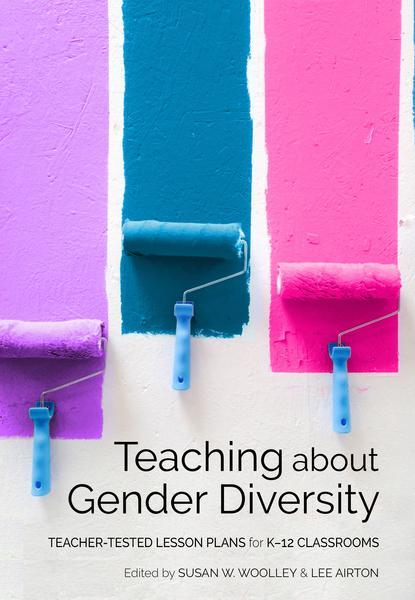
Together with community research partner Ashleigh Talbott, Sonja Mackenzie (Public Health) published a chapter in a book, Teaching about Gender Diversity: Teacher-Tested Lesson Plans for K–12 Classrooms published in August 2020 by Canadian Scholars Press (Susan W. Wooley & Lee Airton, eds). The book is an ideal resource for students taking education courses on gender, sexuality, diversity and equity, curriculum design, and professional practice. The chapter, entitled “Gender Diversity – Me in HD,” is based on their collaborative research through Gender Justice, a community academic collaboration working with gender expansive and LGBTQ-parented children in a Bay Area public elementary school, to document gender in their lives through the participatory, action-oriented methodology of Photovoice. The chapter presents a workshop plan for educators working with elementary school children to build more inclusive school environments where children can come into their fully gendered selves. As the chapter states: “Schools are spaces of belonging, and also spaces where social and economic inequities become reinforced. Children negotiate gender in their lives as soon as they start coming into an awareness of themselves, and experiences gender’s possibilities – as well as the social regulation of gender – from their earliest years.” Initial funds for this project were provided as part of SCU’s Bannan Gender Justice and the Common Good Initiative.
Tom Plante (Psychology) gave an invited lecture for the Catholic Psychotherapy Association on September 24, 2020, "Seven Lessons Learned from doing 1,000 Evaluations for the Church." The talk focused on themes from 1,000 psychological evaluations conducted for clerical and seminary applicants during the past 30 years as well as those conducted for clerics who are troubled by psychological and behavioral challenges and disorders.
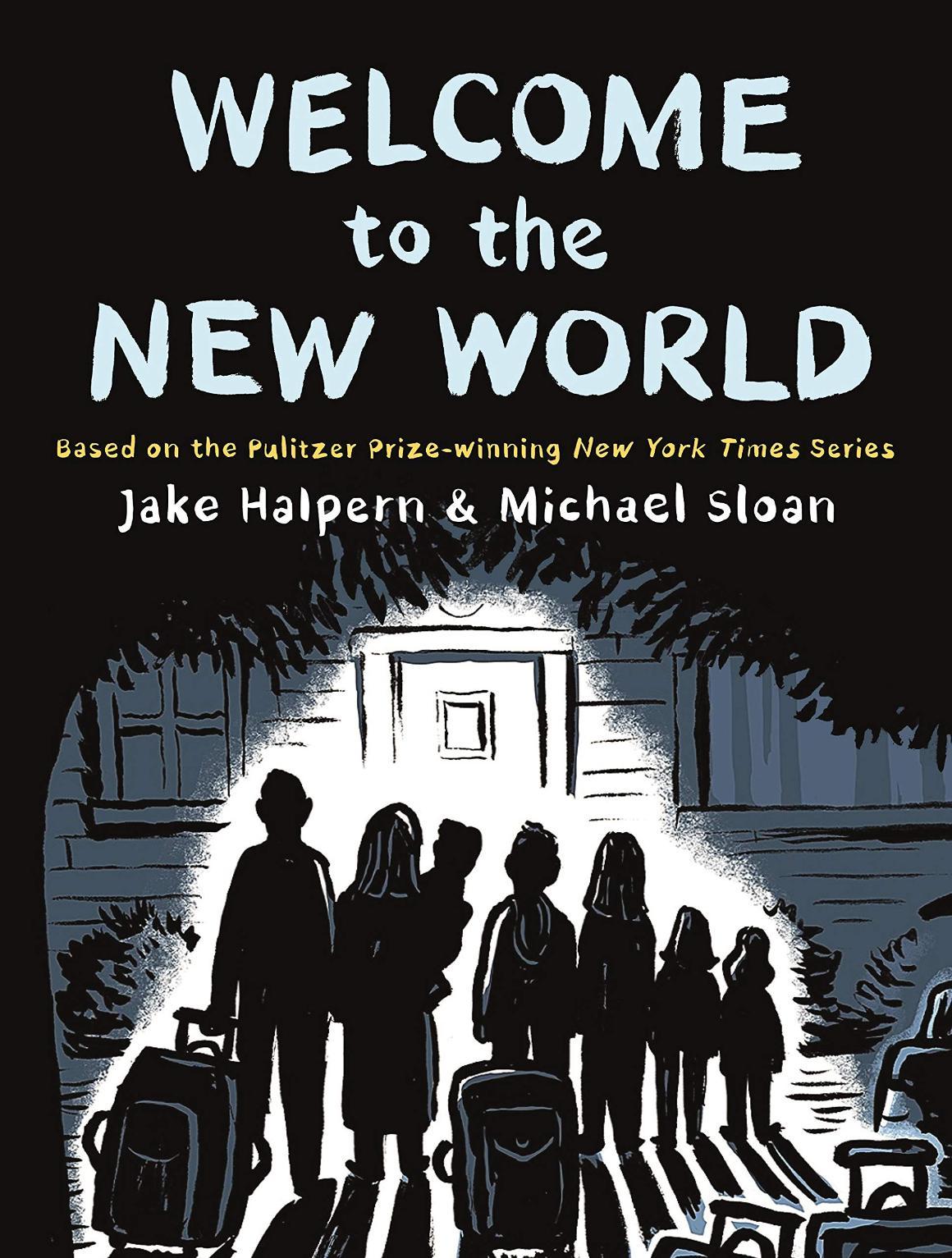
Pulitzer Prize-winning graphic novel translated by Mohammed Kadalah (Modern Languages & Literatures) was recently published as full-length book, Welcome to the New World.

The Committee for the Anthropology of Science, Technology, and Computing (CASTAC) and the Society for the Anthropology of Work (SAW) with the support of the General Anthropology Division (GAD) of the American Anthropological Association (AAA) has awarded Mythri Jegathesan (Anthropology) the 2020 Diana Forsythe Prize for her book, Tea and Solidarity: Tamil Women and Work in Postwar Sri Lanka (University of Washington Press, 2019). The Diana Forsythe Prize "celebrates the best book or series of published articles in the spirit of Diana Forsythe’s feminist anthropological research on work, science, and/or technology, including biomedicine." Of the book, the selection committee wrote, "Tea and Solidarity will change how you think about structural violence, reproductive futurity, decolonial methodologies, and desire."
Grace Stokes (Chemistry & Biochemistry) and a team of chemistry and physics professors were awarded a $25,000 prize from the Research Corporation for Science Advancement for their “Enhancing Science Courses by Integrating Python (ESCIP)” collaborative project. Their aim is to bring together chemistry, physics, and astronomy faculty to share existing resources and develop innovative new Python-based exercises to teach undergraduate science courses that are not computationally-focused (targeting novice programmers). In June 2020, Grace and her ESCIP team hosted two ZOOM-based workshops attended by 58 chemistry, physics and astronomy professors from across the country. Topics included “Using Python programming to enhance existing learning objectives” and “Incorporating programming into multiple courses across the science curriculum.” At these workshops, attendees shared lived experiences (successes/pitfalls/best practices) of incorporating coding exercises into science courses. As a result of these workshops, some attendees who were new to Python began working together with experienced faculty to develop new educational modules for use in virtual lab and lecture courses. Grace is also excited to help facilitate an upcoming in-person ESCIP workshop in Tucson, AZ, scheduled for next summer (July 2021).

Di Di (Sociology) recently published an article titled, “Are Religious Women More Traditionalist? A Cross‐National Examination of Gender and Religion,” in the Journal for the Scientific Study of Religion. Relying on survey data collected in 37 countries, this study analyzes how the relationship between religious attendance and women's gender ideologies is conditioned by their country's gender inequality. The findings indicate that while women's religious attendance is, on average, negatively related to egalitarian gender ideologies, this association is conditioned by religious affiliation. The relationship is also contingent on the level of gender inequality experienced, and grows weaker in countries with more prominent gender inequality. This study reveals the mechanisms that contextualize the intersection of gender and religion, and further provides a global understanding on the intersection between gender and religion.

Kristin Kusanovich's (Theatre & Dance) co-authored article which includes within it an original, five-character, one-act play, "The Two Faces of Leadership: An (Ethno)Drama of the Principalship," was published in Art/Research International: A Transdisciplinary Journal (Volume 5 | Issue 2, October 2020). She and co-author Jerome Cranston, Professor and Dean of the School of Education, University Regina, Canada, have published and presented on the transformative power of arts-based learning in leadership development. Though it is time-intensive and involves multiple specializations on the part of the co-facilitators, arts-based leadership development can: 1) provide extra-dimensional analytical tools; 2) preserve content/subject-matter rigor through the use of fixed scripts grounded in research/praxis as opposed to displays of hypothetical behaviors seen in role play and traditional case study methods, and; 3) offer a safe but fairly realistic simulation of the emotionally-demanding, psychologically-complex, embodied experience of leadership.
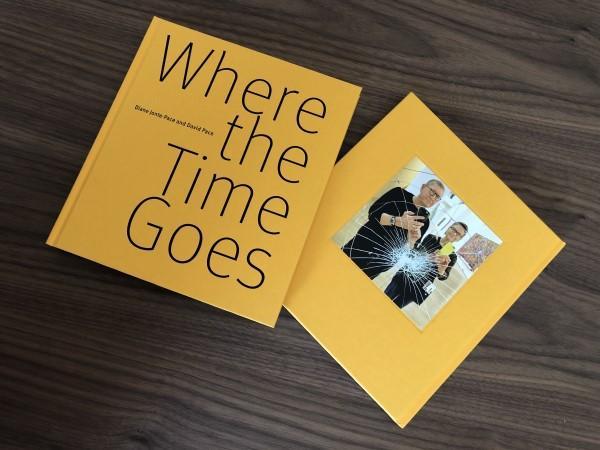
Diane Jonte-Pace (Professor Emerita, Religious Studies) published a book of photographs and short reflections, Where the Time Goes (Schilt Publishing 2020), with co-author David Pace, a Bay Area photographer and former SCU lecturer. The book incorporates cultural and personal reflections on how the postwar generation turned the camera on itself, how photography constructs memories and builds communities, and how the authors’ lives are marked by youth, aging, illness, and recovery. Diane and David also presented a virtual presentation on the book, hosted by the Carmel Center for Photographic Art, on September 10.

Sonja Mackenzie (Public Health) published a chapter, “Queering Biology,” in a September 2020 book, What’s in a Name? Perspectives from Non-Biological and Non-Gestational Queer Mothers (edited by Sherri Martin-Baron, Raechel Johns, and Emily Regan Wills). This essay lies at the nexus of critical gender theory and personal reflection to interrogate meanings of biology and kinship accorded to the social and economic institution of the family. The essay argues that growing anti-LGBTQ sentiment in the United States is being played out in the policy domain through the family unit, and affects the most vulnerable LGBTQ families the most – immigrant families, BIPOC families, and those living in poverty. The essay suggests that biology is a queer space, a space where clear binary renderings may prove incomplete, and where there are opportunities to shift practices of being in families and societies in a world struggling to understand what matters most.

Amy Shachter (Chemistry & Biochemistry) received a $199,425 NSF RAPID award to support her project "Online Vaccination Science Resources for COVID-19 Education." This project will produce C-19 information in the form of videos and workshops, disseminate materials widely to colleges and universities, and provide, through workshops, the knowledge and skills to communicate the science needed to make informed decisions, based on science regarding vaccine acceptance. Broad public access will be achieved through 1) a YouTube channel including videos and supporting material, 2) partnerships with National Center for Science and Civic Engagement’s project Science Education for New Civic Engagement and Responsibilities (SENCER), BioQuest/QUBES, American Association of Engineering Education (ASEE), and Hawaii and Pacific Islands Campus Compact (HIPICC) and 3) virtual workshops. To reach diverse communities, project materials will be produced in both Spanish and English and implement outreach strategies for Indigenous (Native American, Native Hawaiian, and Native Pacific Islander) communities. Project workshops will be open to all educators with potentially thousands of individuals engaging with project materials. The project evaluation and research components will make important contributions to understanding the impact of a rapid science education response to C-19 pandemic crisis.
Betty Young (Physics) has received a $14,342 subaward from Southern Methodist University (funds originated from the National Science Foundation). These funds will support her project "SuperCDMS SNOLAB Operations." The requested funds will allow the PI of the SCU SuperCDMS group to work on-site at the underground SuperCDMS Experiments. The SCU PI has done physics research in the field of cryogenic detectors for more than thirty years and has been an active member of the CDMS and SuperCDMS Collaborations since their inceptions. Her focus has been on hands-on detector development, optimization, and operation.

Cruz Medina (English) published an article with Perla Luna '19 (Sociology and English) in the journal Rhetoric Review called "'Publishing is Mystical': The Latinx Caucus Bibliography, Top-Tier Journals, and Minority Scholarship." This article examines statistical data arrived at through analysis of the NCTE/CCCC Latinx Caucus Bibliography, with survey and interview data from Latinx scholars providing important context about publishing for people of color. Interview responses from Latinx scholars provide important context for the low percentage of articles by Latinx scholars appearing in "top-tier" journals, well below the acceptance rates of the publications. Photo: Cruz Medina presenting with Perla Luna at CCCC 2019 conference. From left to right: Cruz, Enrique Reynoso (University of Washington, Bothell), and Perla Luna.
An article co-authored by Daniel Press (Dean) and his colleagues from UC Santa Cruz titled, "Lessons from the reintroduction of listed plant species in California" was recently published in Biodiversity and Conservation. Reintroduction is an increasingly common practice to conserve and recover threatened and endangered plant species. This study interviewed practitioners involved in reintroduction projects to understand how they view their work and identify persistent resource mismatches, both of which are key to the long-term viability of the listed species.
College of Arts and Sciences Calendar
|
| College of Arts and Sciences |
Questions? Contact Sandy Boyer |
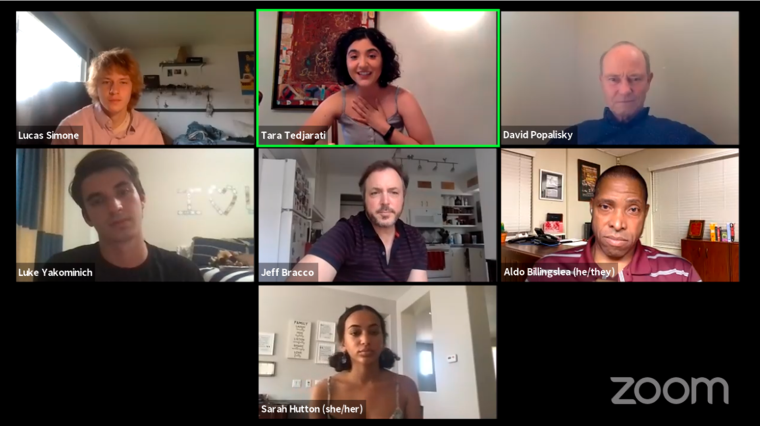
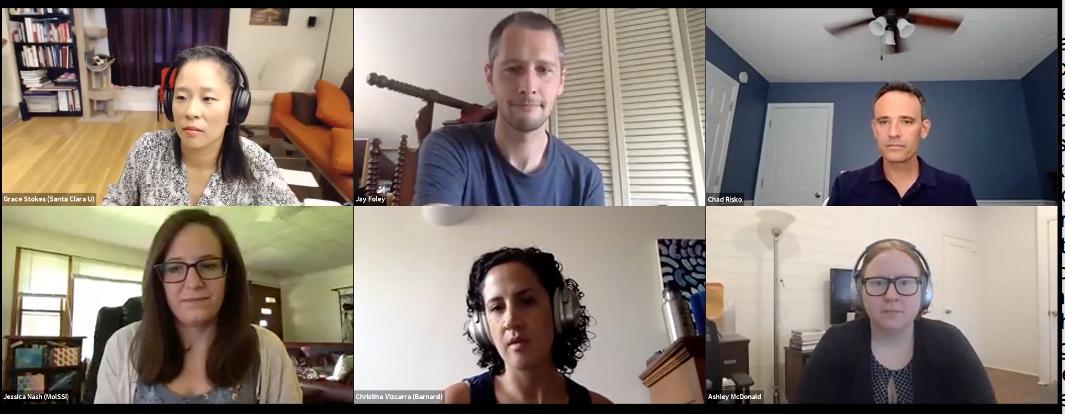 Grace Stokes, top left, helped to organize two workshops for chemistry and physics faculty across the U.S. who use Python to teach science undergraduate courses.
Grace Stokes, top left, helped to organize two workshops for chemistry and physics faculty across the U.S. who use Python to teach science undergraduate courses.
